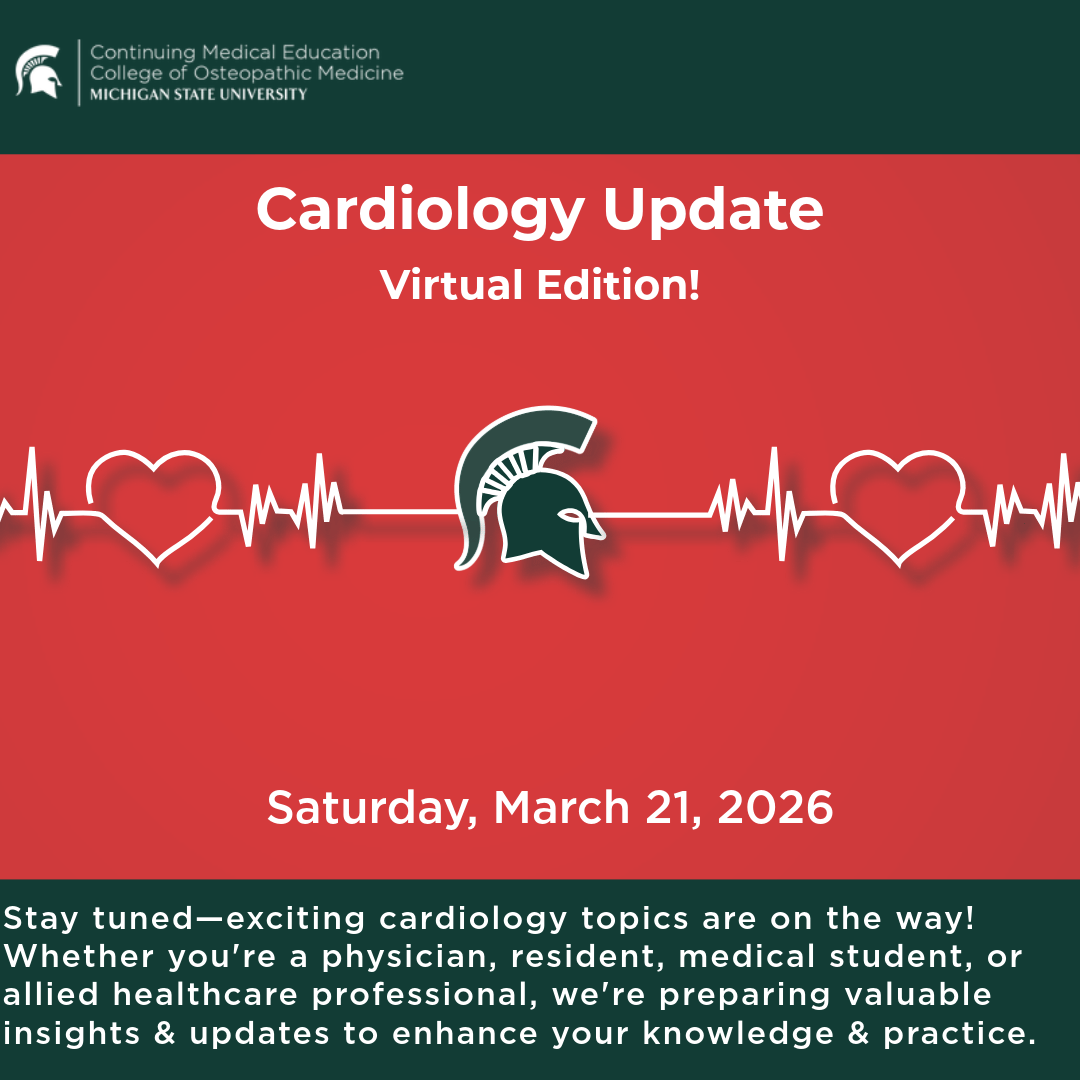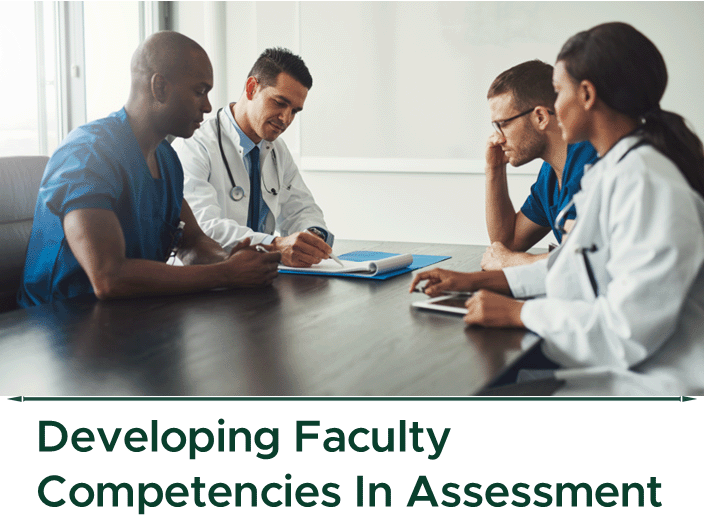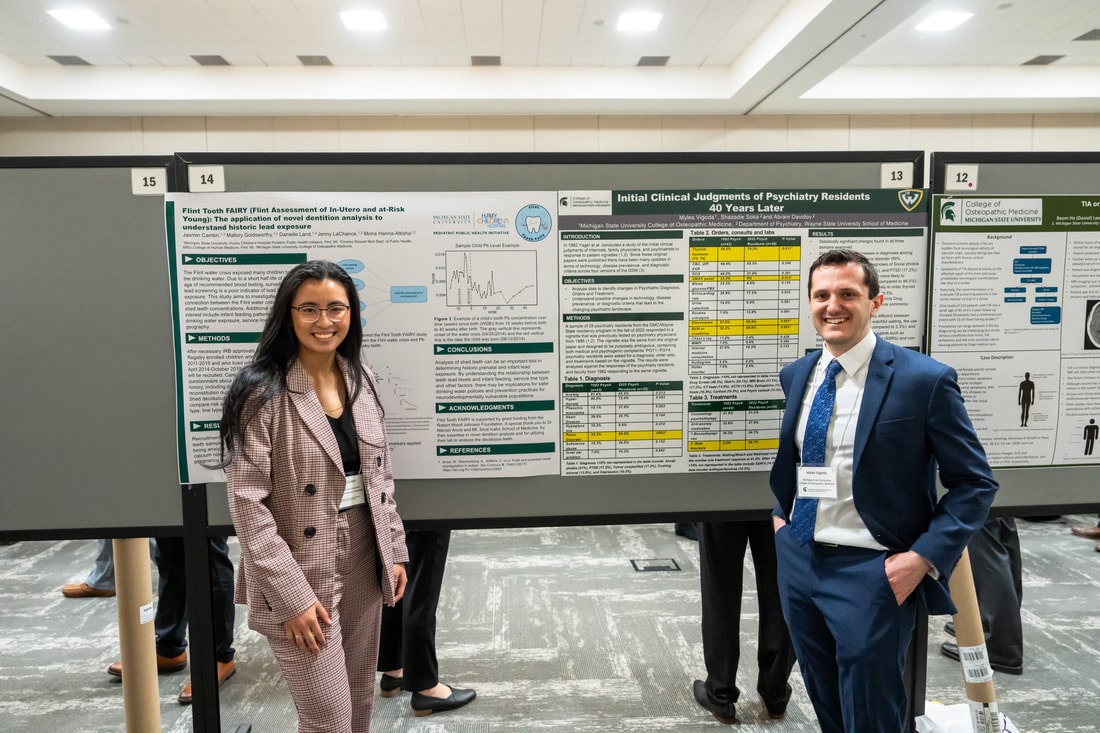Hands-On Training in Evidence-Informed Manual Therapy
This immersive education series is designed for physicians, physical therapists, and healthcare professionals interested in manual therapy grounded in osteopathic philosophy. Developed and taught by expert faculty from Michigan State University College of Osteopathic Medicine, the series offers comprehensive training—from foundational techniques to advanced clinical applications across patient populations and conditions.
Whether you're looking to integrate osteopathic principles into your practice or sharpen your hands-on diagnostic and treatment skills, this series provides practical tools for immediate clinical use. Through MSUCOM's series, you’ll also have the opportunity to earn a certificate in manipulative techniques—enhancing your credentials and verifying proficiency under the guidance of nationally recognized faculty.
Courses emphasize the diagnosis and treatment of musculoskeletal disorders using manual medicine methods, with a focus on integrating these techniques into whole-person, patient-centered care. You'll benefit from small-group instruction, personalized feedback, and a collaborative learning environment.
Course Sequence
.png%3Fh%3D816%26iar%3D0%26w%3D1056&w=3840&q=75)
Registration & Attendance
Preregistration is required for all courses, and registration is contingent upon meeting prerequisites, available class slots, and payment clearance. Tuition can be paid by check or credit card; however, due to MSU’s credit card security standards, we are unable to process credit card payments by phone or fax. Early-bird tuition must be paid in full at least 30 days prior to the course start date.
A confirmation email with course details will be sent to the address provided during registration. Please note that full attendance is mandatory—participants must attend the entire course to receive credit and progress to the next level. Partial attendance is not permitted.
Refund & Cancellation Policy
A full refund is available for cancellations made at least one month before the course start date. Cancellations made 2–4 weeks prior are eligible for a 50% refund. After this period, tuition is non-refundable.
To cancel your registration, please email cme@com.msu.edu.
Please note: The Office of Continuing Medical Education is not responsible for any expenses incurred by participants due to course cancellations.
Course Descriptions
Foundations in Osteopathic Evaluation and Hands-On Techniques
This introductory course explores the philosophy and clinical reasoning behind osteopathic manual medicine, with a focus on hands-on learning. Participants will gain foundational skills in palpatory diagnosis, motion testing, and treatment planning—tools applicable across healthcare disciplines. The course emphasizes manual therapy techniques taught through an osteopathic lens, including:
- Palpation and identification of musculoskeletal dysfunction
- Muscle energy, myofascial release, articulatory, and mobilization techniques
- Biomechanics and functional anatomy
- Patient-centered assessment and treatment integration
- Communication, safety, and ethical considerations in hands-on care
Objectives: Upon completion of this course, the participant will be able to:
- Diagnose dysfunctions of the spine, ribs, pelvis, and extremities
- Identify appropriate indications for hands-on treatment
- Apply key osteopathic techniques within their clinical scope
Develop basic treatment plans using safe and effective manual methods
Credit Hours: 24.75 CME Credits
Early Bird Tuition: $800.00
Full Tuition: $1,000.00
Course Chair: Katie Donahue, D.O.
Required Text: Principles of Manual Medicine, Greenman, PE, Lippincott Williams & Wilkins, Sixth Edition.
A copy of the text is included with course registration.
Core Concepts and Applications in Osteopathic Manual Therapy
Deepen your understanding of muscle energy techniques—a gentle yet powerful approach that uses a patient’s own muscle contractions to improve motion and reduce pain. This course focuses on the evaluation and treatment of spinal and pelvic dysfunctions, building on foundational manual medicine training. Through a mix of lecture, demonstration, and small-group hands-on practice, participants will:
- Expand their structural diagnostic skills
- Review dysfunctions of the vertebral column
- Learn definitive diagnosis and treatment of bony pelvis dysfunctions
- Apply the principles of isometric and isotonic contraction in clinical care
Objectives: Upon completion of this course, the participant will be able to:
- Explain the integration of neuromuscular physiology with manual techniques
- Interpret pelvic biomechanics and identify related joint dysfunctions
- Diagnose and treat spinal, pelvic, and rib cage dysfunctions using muscle energy
- Incorporate exercise principles into patient evaluation and treatment planning
Credit Hours: 34.0 CME Credits
Prerequisite: Principles of Manual Medicine
Early Bird Tuition: $1,400.00
Full Tuition: $1,600.00
Course Chair: Carl Steele, D.O., M.S., P.T.
Osteopathic Approaches for Infants, Children, and Adolescents
This hands-on course is designed for clinicians who work with pediatric patients and want to apply safe, effective manual techniques across various stages of development. Participants will build the diagnostic and palpatory skills needed to assess and treat somatic dysfunction in children presenting with conditions such as:
- Asthma
- Latching Issues
- Otitis Media
- Gerd/Colic
- Torticollis
- Plagiocephaly
Objectives: Upon completion of this course, the participant will be able to:
- Explain the rationale and indications for treating common pediatric conditions using osteopathic manual medicine
- Integrate manual techniques and physical therapy approaches in the care of children with developmental delays
Credit Hours: 22.0 CME Credits
Prerequisites: Principles of Manual Medicine
Early Bird Tuition: $800.00
Full Tuition: $1,000.00
Course Chair: Lisa DeStefano, D.O.
Blending Soft Tissue Approaches within an Osteopathic Framework
This hands-on course explores the integration of neuromuscular reeducation and myofascial release techniques to address chronic tension, postural dysfunction, and pain syndromes. Through an osteopathic lens, participants will assess and treat common movement and myofascial patterns with practical, evidence-informed strategies. Highlights include:
- Diagnosis of dysfunctional postural and movement patterns
- Application of myofascial release to common pain syndromes
- Emphasis on myofascial system biomechanics and fascial anatomy
Objectives: Upon completion of this course, the participant will be able to:
- Explain basic biomechanical principles of fascia and connective tissue
- Apply the M.A.N. (Mechanics, Anatomy, Neuroanatomy) framework in evaluation and treatment
- Demonstrate palpation and treatment skills in myofascial release
- Recognize inherent motion and its role in the fascial system;
- Integrate myofascial release with other manual medicine techniques
- Apply enhanced clinical reasoning to address musculoskeletal dysfunction
Credit Hours: 19.0 CME Credits
Early Bird Tuition: $800
Full Tuition: $1,000
Course Chair: Lisa DeStefano, D.O.
Prerequisites: Principles of Manual Medicine, Required. Muscle Energy I & Exercise Prescription recommended but not required.
Osteopathic Approaches to Upper and Lower Limb Dysfunction
This three-day course focuses on the evaluation and manual treatment of common extremity injuries seen in both athletic and occupational settings. Through an osteopathic lens, participants will learn techniques to assess and manage dysfunctions in the shoulder, elbow, wrist, hip, knee, and ankle. Hands-on instruction includes:
- Joint play assessment and treatment
- Muscle energy and mobilization with impulse techniques
- Diagnosis-driven treatment planning
- Functional rehabilitation strategies for long-term recovery
Objectives: Upon completion of this course, the participant will be able to:
- Explain and apply the principles of joint play in clinical assessment and treatment
- Diagnose acute and chronic dysfunctions of upper and lower limb joints
- Use muscle energy and joint mobilization techniques to treat common sports and work-related extremity injuries
Credit Hours: 20.75 CME Credits
Early Bird Tuition: $800.00
Full Tuition: $1000.00
Course Chair: Lisa DeStefano, D.O.
Prerequisite: Principles of Manual Medicine. Muscle Energy I is recommended but not required.
Integrating Diagnosis, Treatment, and Functional Outcomes
Designed for those who have completed Muscle Energy Technique Part I, this advanced course deepens understanding of somatic dysfunction and introduces more complex applications of muscle energy techniques within a clinical context. Emphasis is placed on clinical reasoning, problem-solving, and integration of manual techniques with exercise-based rehabilitation. Participants will engage in lecture, demonstration, and small group lab sessions to:
- Review and expand prior muscle energy training
- Apply advanced techniques to the spine, pelvis, and extremities
- Integrate muscle energy with exercise planning and patient self-management
- Discuss clinical cases and treatment challenges in a collaborative setting
Objectives: Upon completion of this course, the participant will be able to:
- Apply and refine muscle energy techniques for the upper and lower extremities
- Utilize muscle energy principles in complex case-based scenarios
- Incorporate exercise principles into individualized treatment plans
- Build on prior knowledge to enhance diagnostic and therapeutic precision
Credit Hours: 34.0 CME Credits
Early Bird Tuition: $1,400.00
Full Tuition: $1,600.00
Course Chair: Carl Steele, D.O., M.S., P.T.
Prerequisite: Principles of Manual Medicine & Muscle Energy I.
An Introduction to Osteopathic Cranial Concepts and Techniques
This comprehensive 6-day course introduces participants to the foundational principles, anatomy, and hands-on techniques of osteopathic cranial work. Through a combination of lectures and guided practice, learners will explore the Primary Respiratory Mechanism, cranial palpation, and craniosacral treatment methods. Course highlights include:
- In-depth exploration of cranial anatomy and the physiology of the Primary Respiratory Mechanism
- Palpatory training to develop skill in diagnosing and treating cranial and TMJ dysfunctions
- Techniques including dural membrane release, fluid balancing, and articular unwinding
- Application of craniosacral methods to broader strain patterns in the body
- Discussion of cranial techniques for mild to moderate traumatic brain injury
Objectives: Upon completion of this course, the participant will be able to:
- Identify the components of the Primary Respiratory Mechanism and key cranial articulations
- Apply diagnostic and palpatory skills to assess cranial mechanics and dysfunction
- Evaluate and treat TMJ issues and cranial articular restrictions
- Use craniosacral techniques for fluid and membrane balancing
- Recognize and treat strain patterns extending to the trunk and extremities
- Integrate cranial approaches into care for patients with traumatic brain injury
Credit Hours: 40.00 CME Credits
Early Bird Tuition: $1,100.00
Full Tuition: $1,300.00
MSU GME Alliance Resident: $450.00
Resident Rate: $850
Course Chair: Lisa DeStefano, D.O.
Prerequisites: Principles of Manual Medicine is strongly recommended
**Approved by the AOBNMM as part of the 40-hour cranial requirement for residents.**
Movement Strategies that Reinforce Osteopathic Principles
This four-day course teaches participants how to design individualized exercise programs that support and extend the effects of manual therapy. Rooted in the work of Vladimir Janda and developed by Mark Bookhout, PT, the course integrates osteopathic principles with functional movement and corrective exercise. Designed to complement the muscle energy biomechanical model, the course helps clinicians address neuromuscular imbalance and reinforce structural changes achieved through manual treatment. Course highlights:
- Exercise planning based on biomechanical findings
- Integration of functional movement testing
- Techniques to improve neuromotor control and manage chronic pain
- Self-mobilizing strategies for long-term patient outcomes
Objectives: Upon completion of this course, the participant will be able to:
- Understand functional connections between the upper/lower quarters and the trunk/pelvis
- Identify neuromuscular imbalances contributing to chronic dysfunction
- Perform and interpret functional movement tests for the upper and lower quarters
- Address adverse neural tension and its impact on chronic pain
- Prescribe targeted exercises to refine neuromotor control
- Use self-mobilizing exercises for the spine and pelvis
- Create individualized, functional home exercise programs for patient self-management
Credit Hours: 26.25 CME Credits
Early Bird Tuition: $1,000.00
Full Tuition: $1,200.00
Course Chair: Lisa Chase, P.T., CFMM
Prerequisites: Principles of Manual Medicine & Muscle Energy Part I
Osteopathic Approaches for Pregnancy and Postpartum Support
This course teaches participants how to apply osteopathic manual techniques safely and effectively during all stages of pregnancy and into the postpartum period. Emphasis is placed on pelvic mechanics, posture, diaphragmatic function, and addressing common musculoskeletal complaints such as low back pain, pelvic girdle pain, and rib dysfunction.
Through hands-on instruction and case-based discussion, clinicians will gain practical skills to support structural adaptation during pregnancy, facilitate recovery after birth, and improve comfort and function for perinatal patients.
Objectives: Upon completion of this course, the participant will be able to:
- Describe the anatomical and physiological changes that occur during pregnancy and postpartum, and their implications for manual treatment.
- Assess and diagnose common somatic dysfunctions associated with the perinatal period, including pelvic, sacral, lumbar, and thoracic regions.
- Apply osteopathic manual techniques—including muscle energy, myofascial release, and gentle mobilization—appropriate for each trimester and the postpartum period.
- Address musculoskeletal complaints such as low back pain, sciatica, rib dysfunction, and pelvic girdle pain using safe and effective treatment approaches.
- Evaluate the role of posture, diaphragm function, and pelvic floor mechanics in perinatal musculoskeletal health.
Credit Hours: 22.0 CME Credits
Early Bird Tuition: $800.00
Full Tuition: $1,000.00
Course Chair: J'Aimee Lippert, D.O.
Prerequisites: Principles of Manual Medicine
2026 Upcoming Courses
 Michigan State University College of Osteopathic Medicine offers CME-accredited courses in manual medicine, including cranial technique, pediatric care, TMJ, and muscle energy approaches.
Michigan State University College of Osteopathic Medicine offers CME-accredited courses in manual medicine, including cranial technique, pediatric care, TMJ, and muscle energy approaches.Explore Osteopathic manipulative therapy
Updated 6/10/2025



